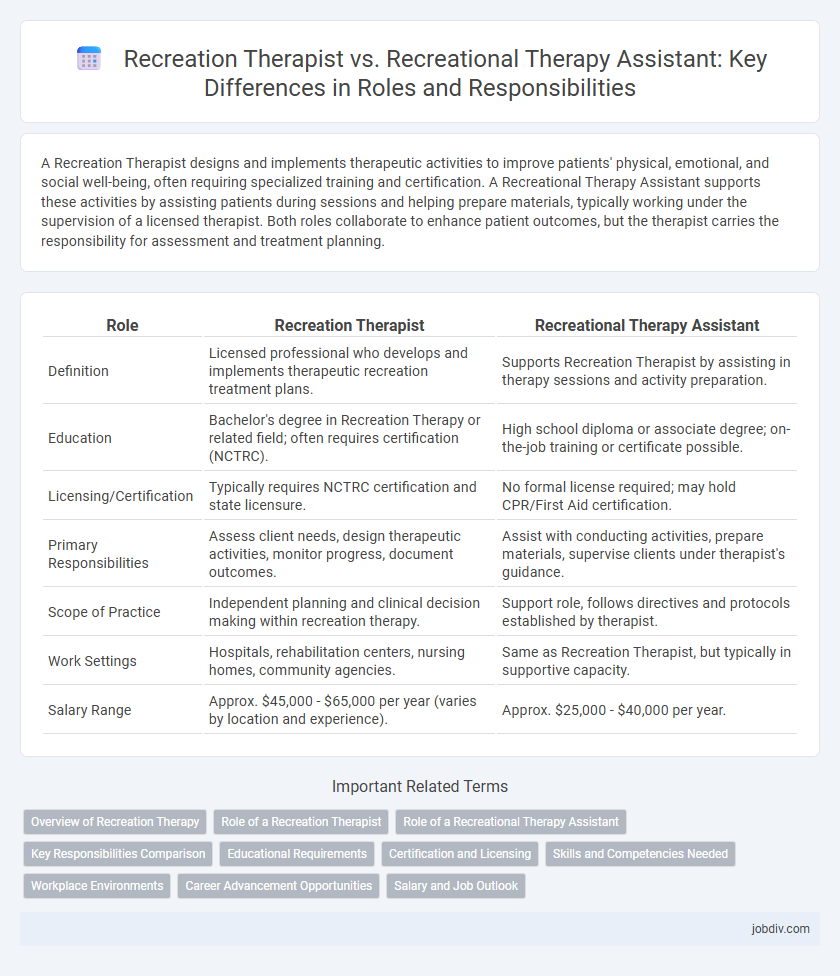A Recreation Therapist designs and implements therapeutic activities to improve patients' physical, emotional, and social well-being, often requiring specialized training and certification. A Recreational Therapy Assistant supports these activities by assisting patients during sessions and helping prepare materials, typically working under the supervision of a licensed therapist. Both roles collaborate to enhance patient outcomes, but the therapist carries the responsibility for assessment and treatment planning.
Table of Comparison
| Role | Recreation Therapist | Recreational Therapy Assistant |
|---|---|---|
| Definition | Licensed professional who develops and implements therapeutic recreation treatment plans. | Supports Recreation Therapist by assisting in therapy sessions and activity preparation. |
| Education | Bachelor's degree in Recreation Therapy or related field; often requires certification (NCTRC). | High school diploma or associate degree; on-the-job training or certificate possible. |
| Licensing/Certification | Typically requires NCTRC certification and state licensure. | No formal license required; may hold CPR/First Aid certification. |
| Primary Responsibilities | Assess client needs, design therapeutic activities, monitor progress, document outcomes. | Assist with conducting activities, prepare materials, supervise clients under therapist's guidance. |
| Scope of Practice | Independent planning and clinical decision making within recreation therapy. | Support role, follows directives and protocols established by therapist. |
| Work Settings | Hospitals, rehabilitation centers, nursing homes, community agencies. | Same as Recreation Therapist, but typically in supportive capacity. |
| Salary Range | Approx. $45,000 - $65,000 per year (varies by location and experience). | Approx. $25,000 - $40,000 per year. |
Overview of Recreation Therapy
Recreation therapy is a specialized healthcare approach that uses leisure activities to improve physical, cognitive, emotional, and social functioning. Recreation therapists design and implement individualized treatment plans targeting patient recovery and well-being, while recreational therapy assistants support these interventions by facilitating activities and monitoring client progress. The collaboration between therapists and assistants enhances therapeutic outcomes by promoting engagement in meaningful recreational experiences.
Role of a Recreation Therapist
A Recreation Therapist designs and implements therapeutic recreational programs tailored to improve patients' physical, emotional, and social well-being through evidence-based activities. They conduct assessments, develop individualized treatment plans, and measure patient progress to ensure effective therapeutic outcomes. Their expertise in therapeutic techniques distinguishes them from Recreational Therapy Assistants who primarily support the delivery of these programs under supervision.
Role of a Recreational Therapy Assistant
A Recreational Therapy Assistant supports Recreational Therapists by implementing treatment plans that enhance patients' physical, emotional, and social well-being through therapeutic activities. They monitor client progress, assist with activity preparation, and ensure safety during sessions, working closely with healthcare teams to adapt interventions. Their role is essential in facilitating recreation-based therapy that promotes rehabilitation and improves quality of life for individuals with disabilities or chronic conditions.
Key Responsibilities Comparison
Recreation Therapists develop and implement individualized treatment plans using therapeutic recreational activities to improve patients' physical, emotional, and social well-being. Recreational Therapy Assistants support these plans by leading activities, monitoring patient progress, and assisting with documentation under the supervision of licensed therapists. While therapists are responsible for assessment and program design, assistants focus on facilitating activities and ensuring client engagement.
Educational Requirements
Recreation Therapists typically require a bachelor's degree in therapeutic recreation or a related field, emphasizing courses in anatomy, psychology, and activity planning. Recreational Therapy Assistants generally need a high school diploma or associate degree with specialized training or certification in recreation therapy techniques. Certification standards, such as the Certified Therapeutic Recreation Specialist (CTRS) credential, are mandatory for therapists but optional for assistants, reflecting the difference in educational depth and responsibility.
Certification and Licensing
Recreation therapists typically require certification such as the Certified Therapeutic Recreation Specialist (CTRS) credential, which is obtained through the National Council for Therapeutic Recreation Certification (NCTRC) and often mandates a bachelor's degree and supervised clinical experience. Recreational therapy assistants generally do not need CTRS certification but may pursue state-specific licenses or certifications to support their roles, depending on local regulations. Licensing requirements for both positions vary by state, with recreation therapists more frequently subject to formal licensure to practice independently.
Skills and Competencies Needed
Recreation therapists require advanced skills in therapeutic techniques, patient assessment, and individualized treatment planning to effectively use recreational activities for improving physical, emotional, and social functioning. Recreational therapy assistants support therapists by demonstrating strong interpersonal communication, activity facilitation, and basic knowledge of therapeutic recreation principles to ensure safe and engaging experiences for clients. Both roles demand empathy, adaptability, and teamwork, but therapists must possess higher clinical expertise and certification credentials such as CTRS (Certified Therapeutic Recreation Specialist).
Workplace Environments
Recreation Therapists commonly work in hospitals, rehabilitation centers, long-term care facilities, and mental health clinics, where they design and implement therapeutic recreational programs tailored to individual patient needs. Recreational Therapy Assistants typically support these programs in similar settings but are more likely to be employed in community centers, senior living facilities, and outpatient therapy clinics, assisting with group activities and client supervision. Both roles require collaborative interactions within interdisciplinary teams to promote patient recovery, social integration, and improved quality of life.
Career Advancement Opportunities
Recreation Therapists often have greater career advancement opportunities due to their higher level of education, typically requiring a bachelor's or master's degree and professional certification, such as the Certified Therapeutic Recreation Specialist (CTRS) credential. Recreational Therapy Assistants usually support therapists under supervision and may have more limited advancement prospects, often needing additional education or certification to move into therapist roles. Career growth for assistants can include gaining hands-on experience and pursuing formal training to transition into a Recreation Therapist position.
Salary and Job Outlook
Recreation therapists typically earn a median annual salary of around $48,000, while recreational therapy assistants earn approximately $30,000 per year. Job growth for recreation therapists is projected at 11% through 2031, reflecting strong demand in healthcare and rehabilitation settings, whereas recreational therapy assistants may see a slower growth rate of about 8%. Higher salaries and faster job growth for therapists are driven by their greater responsibilities and required certifications.
Recreation Therapist vs Recreational Therapy Assistant Infographic

 jobdiv.com
jobdiv.com